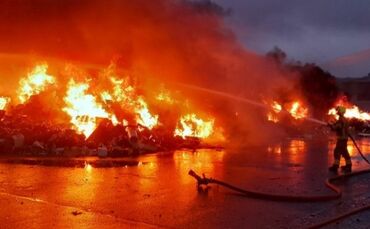

New 'Stop Battery Fires' campaign reveals nearly half of householders are not aware of fire risks that result from failing to dispose of batteries safely
Over 700 fires in bin lorries and at waste sites are being caused each year by batteries that are not removed from electrical products before they are thrown out.
That is the headline conclusion of new research conducted by non-profit Material Focus, which warns e-waste rules are being routinely flouted, leading to environmental harm and significant safety risks.
The research surveyed 60 UK local authorities and found nearly 90 per cent have seen fires caused by batteries become an increasing problem.
The study follows similar research conducted by the Environmental Services Association (ESA) and Eunomia in 2021 which identified that 201 fires were caused by battery fires. Although the two pieces of research followed different methodologies, Material Focus said its research indicates that fires caused by batteries are potentially a far bigger issue than previously reported.
The new report, which is timed to coincide with ‘Black Friday' promotions that are expected to result in a surge in sales of electrical goods, also found that up to 45 per cent of householders are unaware of the fire risk if they do not safely dispose of batteries, with a quarter of householders admitting to simply throwing them away.
Material Focus is today launching a new 'Stop Battery Fires' campaign which is designed to raise awareness of the simple actions that householders can take to reduce the risk of fires.
"People should never bin their electricals or their portable batteries," said Scott Butler, executive director of Material Focus. "If they can, they should remove any hidden batteries from their electricals and recycle the batteries and electricals separately. If they can't remove the batteries then they should recycle their electricals separately as always.
"Having listened to the numerous stories of flames engulfing waste and recycling trucks as they drive down residential streets, it's important that we all take action now to keep our streets, householders, waste and local authority staff, and fire fighters safe. People can find their nearest recycling point for batteries and electricals by visiting our recycle your electricals website."
Strict rules govern the disposal of waste electronic and electrical equipment (WEEE), which is not supposed to be sent to landfill due to the environmental impact of the chemicals contained in electrical equipment. However, the waste management industry and environmental campaigners have long complained that WEEE rules are routinely flouted by households and businesses alike, with a lack of enforcement and inadequate collection infrastructure and educational campaigns blamed for relatively low e-waste recycling rates.
In related news, waste management giant SUEZ today launched a new guide that provides practical advice on scaling up and maximising opportunities for reuse at Household Waste Recycling Centres (HWRCs) across the country.
The report, titled Putting Reuse at the Heart of Your Household Waste Recycling Centre, offers local authorities practical steps for converting HWRCs into Household Reuse and Recycling Centres (HRRCs).
Sarah Ottaway, sustainability and social value lead at SUEZ recycling and recovery UK, said: "The UK's net zero objectives will require us all to move toward a more circular economy. To achieve this, a collaborative industry approach focused on knowledge sharing and expertise, underpinned by strategic government policy is required. However, the adoption of reuse is far from universal, for a range of reasons including lack of investment, prioritisation and an absence of government incentives or targets.
"Using the knowledge and learnings we have acquired over the past decade, our new reuse guide will provide valued partners and peers in the sector with ideas and insights that maximise reuse in every location, support skilled job creation and generate revenue to support more developments and greater ambitions."
* This article was originally published here
Comments
Post a Comment